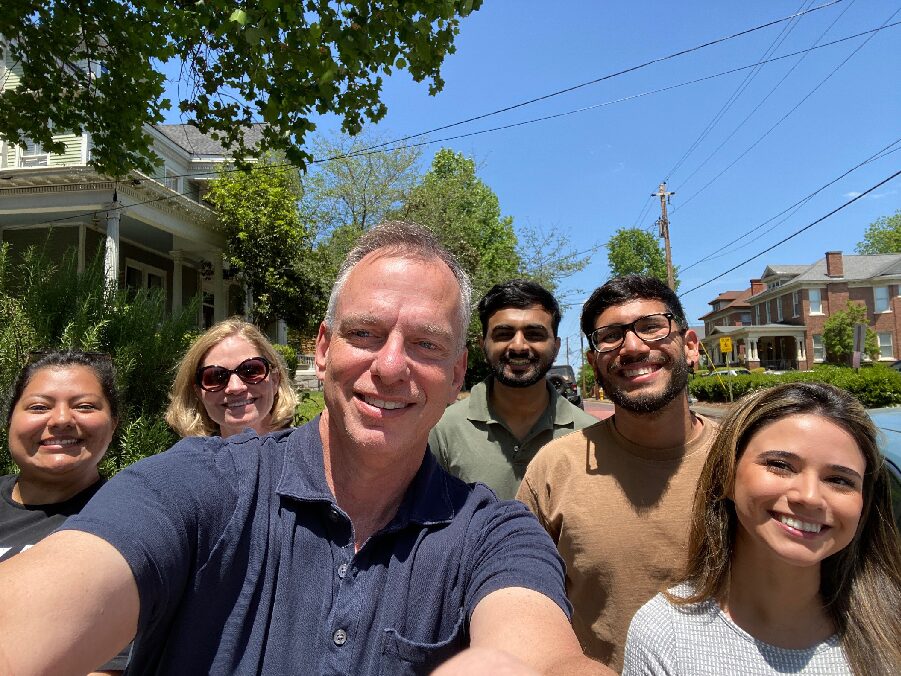
Thanks to a group of Mercer Law students in the 2022 Asylum and Human Rights Clinic, a Kurdish man who was persecuted in Turkey won his immigration appeal in February and recently gained his freedom.
The man’s initial petition was denied after a faulty hearing, and he was in danger of being deported. Under the close supervision of Professor Scott Titshaw and Adjunct Professor Elena Albamonte, clinic students Miles Voss, Karan Patel, Chris Alviz, Jessica Luna, and Maritza Gonzalez worked in teams to interview the client using interpreters, review transcripts of immigration court hearings, identify issues and errors, unearth new facts about the client’s case, research domestic and international law and country conditions, develop a theory of the appeal, and draft appellate briefs, affidavits, and motions. Voss and Patel graduated in 2022, and Alviz, Luna and Gonzalez graduated in 2023.
“The case we won was an appeal to the Board of Immigration Appeals of a case that had initially been denied by an immigration judge at the Stewart Detention Center in South Georgia, where our client was being held,” Titshaw said. “The client was referred to us by an attorney at the Southeast Immigrant Freedom Initiative of the Southern Poverty Law Center, whom we’d known from prior cases.”
The students listened to hours of tape-recorded testimony from the original hearing and made notes of instances where there were recording errors and other due process concerns that they used to demonstrate that the adverse credibility finding should be overturned. They also explained or refuted alleged inconsistencies in the testimony. The Board of Immigration Appeals agreed and remanded the case to the immigration judge. There was another hearing, during which the respondent appeared pro se. The immigration judge found the persecuted Turkish national to be credible and granted him withholding of removal. After almost two years of detention, he was finally released to live with family members in the United States.
“In the clinic we worked on the client’s appeal for a new trial,” Gonzalez said. “Our job was to write the brief that was submitted to the Board of Immigration Appeals. We spent a whole semester learning the law, having interviews with our client through a translator, directing every aspect of the original trial, and writing the brief. Once we had the brief completed it was submitted to the Board of Immigration Appeals where, based on our brief, a judge granted the motion for a new trial.
“Our client then had his new trial and won his appeal. He was granted withholding of removal and was freed from detention, so he is no longer in danger of being deported.”
The Mercer Asylum and Human Rights Clinic represents clients seeking relief from removal based on claims of past persecution or torture or fear of future persecution or torture in their country of nationality. Students learn the refugee and asylum laws through a study of the Immigration and Nationality Act and international human rights treaties. They represent clients on appeal before the Board of Immigration Appeals. The clinic has also prepared and filed amici curiae briefs with the Board of Immigration Appeals. In the clinic, students learn advanced legal writing techniques, including appellate strategies, persuasive storytelling, the use of expert reports, and effective argument skills.
Titshaw proposed establishment of the clinic to the Law School faculty in 2019 and taught the first class in the spring of 2020. He had practiced immigration law for 12 years and served as the chapter chair of the Georgia-Alabama chapter of the American Immigration Lawyers Association before joining the faculty at Mercer.
In 2021, Albamonte taught the course. With about 40 years of experience working on all sides of asylum and Convention Against Torture cases, she has been involved with the clinic since its inception. Albamonte has served as an attorney with the U.S. Departments of State, Justice, and Homeland Security, as an attorney adviser with the Board of Immigration Appeals, as deputy chief counsel with U.S. Immigration and Customs Enforcement, and as a private immigration attorney representing individuals in the asylum, removal and appeals processes. In 2022, Titshaw and Albamonte co-taught the clinic.
“Clinical experience provides students with a deep understanding of the complex law governing immigration, humanitarian relief in removal proceedings and asylum, as well as collaboration, cultural competency, and self-evaluation,” Titshaw said. Students also acquire practical skills, including advanced persuasive writing techniques and cross-cultural client communication, which will be useful in whatever area of law they practice.”
Gonzalez said she signed up for the clinic because she has always had an interest in pursuing immigration law.
“As an immigrant myself, I personally went thought the immigration process, and I have experienced the long, expensive and complicated process firsthand,” she said. “However, I’ve always been passionate about advocating for others and the asylum clinic gave me the opportunity to have firsthand experience guided by experts in the field.”
Mercer Law Dean Karen J. Sneddon said, “Experiential learning opportunities prepare students for practice by providing hands-on learning experiences. This important clinic is one example of Mercer’s commitment to providing students meaningful learning experiences that also benefit the community.”
The enrollment limit for the course is eight. Students must apply and be accepted to participate in the clinic. Five students were admitted in 2022.









